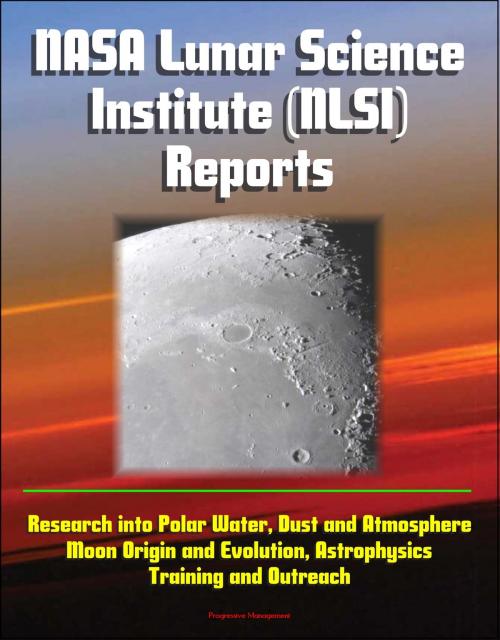NASA Lunar Science Institute (NLSI) Reports - Research into Polar Water, Dust and Atmosphere, Moon Origin and Evolution, Astrophysics, Training and Outreach
Nonfiction, Science & Nature, Science, Physics, Astronomy, Astrophysics & Space Science| Author: | Progressive Management | ISBN: | 9781310054730 |
| Publisher: | Progressive Management | Publication: | August 28, 2014 |
| Imprint: | Smashwords Edition | Language: | English |
| Author: | Progressive Management |
| ISBN: | 9781310054730 |
| Publisher: | Progressive Management |
| Publication: | August 28, 2014 |
| Imprint: | Smashwords Edition |
| Language: | English |
Three reports provide information on the activities of the NASA Lunar Science Institute (NLSI), founded in March 2008. The Institute is based on the premise that exploration and planetary science are fundamentally intertwined; exploration enables science, but basic scientific understanding is foundational to safe, effective, and efficient human exploration. While the focus is on the Moon, NLSI scientists also study lunar science within a broader context of both planetary science and future human exploration beyond low Earth orbit.
The NLSI is modeled on the successful NASA Astrobiology Institute (NAI), which pioneered the concept of a virtual scientific institute. Like NAI, NLSI consists of a distributed network of competitively selected teams, managed and directed by a small central office. The NLSI Central Office is located at NASA Ames Research Center, Moffett Field, California. A virtual institute is complementary to both individual research and analysis grants and the establishment of a "bricks and mortar" organization. First, providing funding to existing research institutions leverages past investments ranging from research infrastructure to student training. Also, flexibility and stability — essential to maximizing efficiency across teams — are achieved through longer support periods with larger funding awards than provided through small R&A grants to a single researcher. Second, a virtual institute integrates scientific research across both geography and disciplines; the products exceed the sum of the individual efforts and often cannot be foreseen. Third, a virtual institute requires minimal overhead, with most of the resources going directly to the distributed research teams.
Each NLSI team brings together researchers from multiple organizations who have related capabilities and interests. The seven teams include more than 180 individual scientists and future researchers. The Institute also partners with international organizations, both research institutions (Affiliate partners) and government- based organizations (Associate partners) on a no-exchange of funds basis. The current international teams represent Canada, Germany, Israel, Korea, the Netherlands, Saudi Arabia, and the United Kingdom.
Three reports provide information on the activities of the NASA Lunar Science Institute (NLSI), founded in March 2008. The Institute is based on the premise that exploration and planetary science are fundamentally intertwined; exploration enables science, but basic scientific understanding is foundational to safe, effective, and efficient human exploration. While the focus is on the Moon, NLSI scientists also study lunar science within a broader context of both planetary science and future human exploration beyond low Earth orbit.
The NLSI is modeled on the successful NASA Astrobiology Institute (NAI), which pioneered the concept of a virtual scientific institute. Like NAI, NLSI consists of a distributed network of competitively selected teams, managed and directed by a small central office. The NLSI Central Office is located at NASA Ames Research Center, Moffett Field, California. A virtual institute is complementary to both individual research and analysis grants and the establishment of a "bricks and mortar" organization. First, providing funding to existing research institutions leverages past investments ranging from research infrastructure to student training. Also, flexibility and stability — essential to maximizing efficiency across teams — are achieved through longer support periods with larger funding awards than provided through small R&A grants to a single researcher. Second, a virtual institute integrates scientific research across both geography and disciplines; the products exceed the sum of the individual efforts and often cannot be foreseen. Third, a virtual institute requires minimal overhead, with most of the resources going directly to the distributed research teams.
Each NLSI team brings together researchers from multiple organizations who have related capabilities and interests. The seven teams include more than 180 individual scientists and future researchers. The Institute also partners with international organizations, both research institutions (Affiliate partners) and government- based organizations (Associate partners) on a no-exchange of funds basis. The current international teams represent Canada, Germany, Israel, Korea, the Netherlands, Saudi Arabia, and the United Kingdom.















